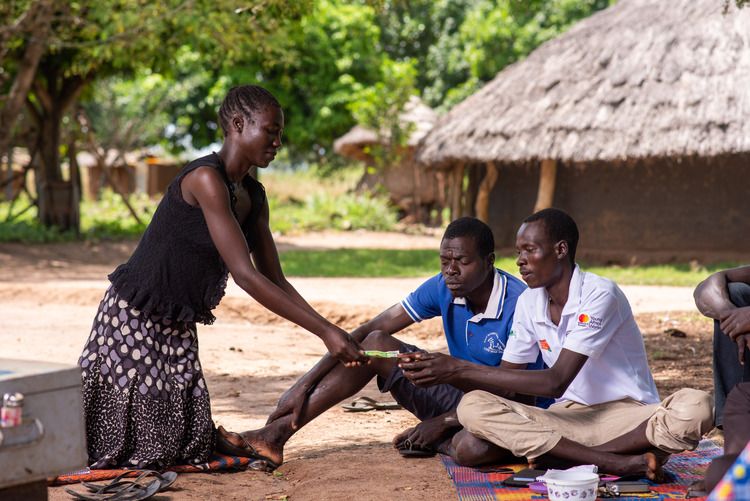Following U.S. aid cuts, vulnerable Ugandans are dying, providers say
‘You become a murderer’ when you make such cuts, says HIV+ people’s advocate
Andrew Green reports for Devex News:
The Trump administration has canceled or suspended dozens of programs to provide HIV services to the most marginalized communities. The people running those programs say lives are now at risk.

In Uganda, HIV service providers said the most vulnerable among the people they supported are now beginning to die following U.S. President Donald Trump’s sweeping cuts to global HIV/AIDS programs.
That seemingly includes Lydia Nabirye. She stopped taking her HIV medicines and died outside the eastern Ugandan town of Kamuli on March 26 after a U.S.-supported mental health program helping her maintain her treatment was eliminated. She was 28 years old.
Her passing happened just three weeks after Elon Musk, who oversaw the U.S. aid cuts, posted that “no one had died as a result of a brief pause to do a sanity check on foreign aid funding. No one.”

As that pause has turned into an ongoing suspension or outright cancellation of programs specifically supporting the most marginalized in countries with the highest HIV burden, there is a fear that Nabirye’s death is the harbinger of a coming crisis for those communities.
“You can’t imagine how many people have benefited from the USA’s support,” Hajjati Abdul Jamal, a trans woman and organizer for Uganda’s marginalized communities, told Devex. “When you get to this particular point, it means erasing the existence of us and how we can be able to access the basic services.”he President’s Emergency Plan for AIDS Relief.
Researchers have estimated that if funding for the U.S. President’s Emergency Plan for AIDS Relief, or PEPFAR — the program providing most U.S. global HIV funding — is not restored, there could be as many as 2.9 million more HIV-related deaths by 2030. In Uganda, service providers said those deaths have already begun. [The United Nations’ anti-AIDS agency predicts 6.3 million deaths.]
The U.S. State Department, which administers PEPFAR, did not respond to a request for comment.
Abandoned
Nabirye never had it easy. She had to drop out of high school when her family ran out of money. She found a job teaching primary classes and started saving her salary so she might resume her own education. She met a partner and, six years ago, learned she was pregnant. She also learned that she was HIV-positive.
Her son was also born with the disease and then contracted yellow fever two days after his birth, which almost killed him. Nabirye’s partner abandoned them both.
She returned to her mother, Saida Nabirye, and together they ran a roadside restaurant. Despite the challenges, her mother remembers that Nabirye “was so happy. She used to bring so, so many customers.” They were drawn in by her laughter.
After three years passed, though, it was clear that Lydia’s son was never going to learn to speak or to walk. Saida said that sent her daughter into a depression. Lydia began to refuse her HIV treatment.
The HIV clinic the family attended, a 20-minute drive away over rough roads, noticed Lydia’s absence. The health workers asked her to come in for testing, which showed she was not suppressing the virus. They flagged the situation to the case care worker from MUCOBADI stationed at their clinic.

MUCOBADI is a Ugandan nonprofit. Launched in 2000, it runs a program for HIV-positive orphans and vulnerable children and their families in eastern and central Uganda. It started out with members providing what support they could to the people struggling in their communities.
Over the past 10 years, MUCOBADI has grown into an organization supporting 54,000 children and their families, according to Gerald Kasula, the [program’s leader]. Its services are extensive: It offers food to families who don’t have enough to eat, school supplies to students who can’t afford them, and home visits to both children and caregivers who are struggling, such as Lydia. Its organizers believe these additional services are integral to ensure a child — particularly a poor child — remains on HIV treatment.
MUCOBADI’s expansion was only possible because of funding from PEPFAR.
PEPFAR, launched by former U.S. President George W. Bush in 2003, is credited with saving 26 million lives. At $110 billion, it is the largest investment any country has ever made in fighting a single disease. And in a place like Uganda, where around 5% of adults are infected with HIV, PEPFAR funding is now integrated into virtually every service the country offers to treat or prevent the disease.
“The funding from the U.S. gave us a boost,” Kasula told Devex. “We have been a very vibrant organization until Trump came.”
A year ago, MUCOBADI started sending the case care worker, Fatuma Bilibawa, to Lydia’s house daily to make sure she took her ARVs and to offer her encouragement. The service was a crucial lifeline in a country with virtually no mental health support. Lydia seemed to be recovering. She began to pepper Bilibawa with questions about how to pursue a nursing degree.
“She told me she wanted to treat people in the community,” Bilibawa said.
On Jan. 24 of this year, the Trump administration suspended MUCOBADI’s programs amid a broader funding pause to conduct a 90-day review of all global aid spending. A few weeks later, Kasula got word that the program had been canceled entirely.
“The beneficiaries were the worst hit,” he said. “We just had to abandon them.”
Without Bilibawa’s support, Saida said her daughter stopped taking her treatment and rapidly declined. Her hospital records, seen by Devex, confirm that she died “due to not taking drugs.”
‘You become a murderer’
After the initial aid suspension, the Trump administration allowed some services to resume, including lifesaving treatment and programs to prevent the transmission of HIV from mothers to their newborns.
Kasula believed MUCOBADI’s work met the criteria because it was classified as a program for orphans and vulnerable children, though it fell outside the Trump administration’s narrow definition of “lifesaving.” Instead, it was considered a complementary service and therefore ineligible for a waiver. Kasula was never given the chance to appeal this decision.
It was the same for hundreds of services that governments either cannot afford to or have no interest in replacing. Services that cannot easily be shoved into general HIV clinics. Prevention programs for criminalized communities, such as gay men and drug users. Mental health outreach. Efforts to deliver treatment to the elderly or handicapped.
PEPFAR officials have consistently explained that they have developed and funded these initiatives because it is the only way to achieve the goal of ending AIDS as a public health threat by 2030.
But now, across Uganda, many of those programs have been canceled by the Trump administration. Those that remain are still suspended or are operating under temporary waivers, despite the fact that the window for the 90-day review has passed.
By canceling these programs, “you become a murderer,” Raymond Kwesiga of the National Forum of People Living with HIV/AIDS Networks Uganda told Devex. “I don’t know whether murderer is an understatement.”
The Ugandan government, meanwhile, has not taken any steps to replace most of these services.
All alone
In these circumstances, it was inevitable the people who relied on these services would start to die, Wamala Twaibu said. That includes the community he is trying to help as the head of the Uganda Harm Reduction Network, or UHRN. The nonprofit set up the only clinic offering medically assisted therapy for people who inject drugs in Kampala, the country’s capital. The clinic has more than 700 clients, according to Twaibu, who have gained access to methadone or other heroin replacement therapy and hundreds more who have gotten services to help treat or prevent HIV, including clean needles.
It was all supported by PEPFAR.
Immediately following Trump’s stop-work order, the clinic had to shut everything down, including HIV treatment and opioid replacement therapy. Over the next weeks, Twaibu received reports of more than 200 overdoses as people in treatment relapsed and three unconfirmed deaths.
Inexplicably, the U.S. State Department granted a waiver to UHRN’s implementing partner, allowing the clinic to reopen less than three weeks after it was shut down. That waiver has since expired, but no one has yet told Twaibu to stop operations, so it exists in a kind of limbo. He does not expect it will survive the Trump administration’s review.
Clients “are aware that the treatment could be no more,” Twaibu said. “So people feel like the treatment is on and off. The last time [the clinic shut down] they suffered.” They are preparing to suffer again.
It is not just the people who inject drugs. Across Uganda, households now fear they are on the brink of being completely abandoned.
That is certainly how Saida Nabirye feels. Since her daughter’s death, Saida has taken over the care of her grandson. He requires all of her attention, so she had to shutter the restaurant she once ran with her daughter, Lydia. She is not sure how they will continue to survive.
“There are no services to help me,” she said. “I am all alone.”




